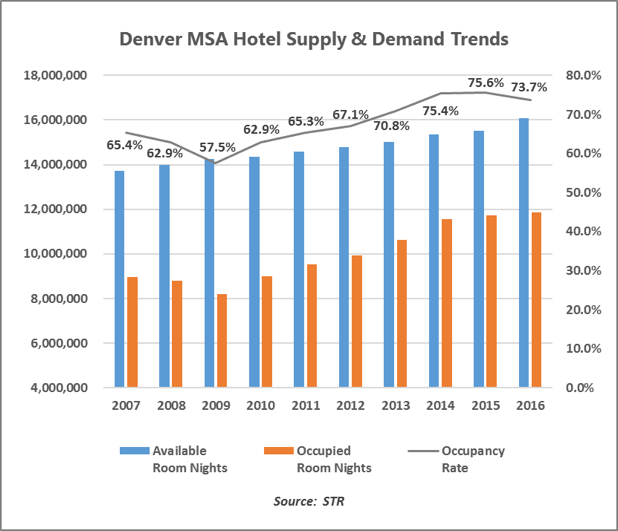By Noel A. Palma
Seemingly, there is a report of a new hotel opening in the Denver MSA every few weeks. These launches are symbolic of the growth and health of the local economy. However, it is important to assess whether all of the new hotels can be sustained and whether the overall Metro Denver lodging industry can continue to thrive. US Hotel Advisors (“USHA”), headquartered in Metro Denver, is pleased to present its “Denver MSA Hotel Impact Study,” an independent study to gauge the impact of the new hotel supply on the Denver MSA lodging market. A summary of the findings are presented below. For a copy of the full Study, please contact the Author.
Method of Study
As part of the Study, USHA evaluated various demographic and economic indicators to assess their coefficient of correlation with local hotel demand trends. Based on this evaluation, it was determined that metro area population growth has historically had a 93.6% correlation with movements in local leisure hotel demand and that metro area office space occupancy had a 99.3% correlation with movements in area business hotel demand. By utilizing these correlation factors and regression analysis, USHA calculated five-year hotel demand (occupied room night) projections for Metro Denver. The hotel demand projections were then divided by the hotel supply (available room nights) projections to arrive at a projection of hotel occupancy. It is important to note that while this Study uses two specific factors (population and office space statistics) for the regression analysis, there are obviously countless other factors that affect the area’s total occupied room nights.
Metro Denver Flourishing
The Denver MSA’s population and economy has grown at a fevered pace over the last five years and has been awarded several major distinctions, such as U.S. News & World Report “Best Places to Live” and Forbes “Best Places for Business and Careers.” The Denver MSA witnessed population growth of 12.2% between 2010 and 2016 – the 12th highest rate in the nation amongst major metro areas, – while the State of Colorado’s population grew at the second-fastest rate in the U.S. in 2016. The influx of people has created a red hot residential real estate market with extremely short listing periods, rapid price appreciation, low apartment vacancy rates, and skyrocketing rental rates. In December 2016, the Denver MSA’s unemployment rate was at a historic low of 2.6%. The expansion of both the population and business bases in Metro Denver have inevitability led to a spike in lodging demand.

Consistent with the vigorous demographic and economic expansion that has occurred in the Denver MSA over the last five years, lodging demand in the area has surged and hotel occupancy levels have hit historic highs. Metro Denver witnessed particularly strong hotel demand growth in 2013 and 2014, when the area benefitted from a general rebound in the national hotel industry, consecutive periods of local economic growth after the “Great Recession,” and the start of legalized retail marijuana sales within the State in 2014.
Expansive New Hotel Supply
The spike in lodging demand has led to widespread hotel development in Metro Denver. Thus far, the local lodging market has absorbed the new hotel supply and continues to thrive. However, over 7,300 hotel rooms are projected to open in the Denver MSA in 2017 and 2018. There is reasonable doubt as to whether the Metro Denver hotel market can accommodate the new room supply while maintaining current occupancy levels.
The “White Elephant”
The largest single hotel in development in Metro Denver is the Gaylord Rockies Resort & Convention Center, which will have 1,507 guestrooms upon its completion in late 2018. With such a massive property, there has been much debate and discussion as to the impact the hotel will have on the local lodging market. As detailed in the Study, USHA is of the opinion that the impact of this property will be limited.

